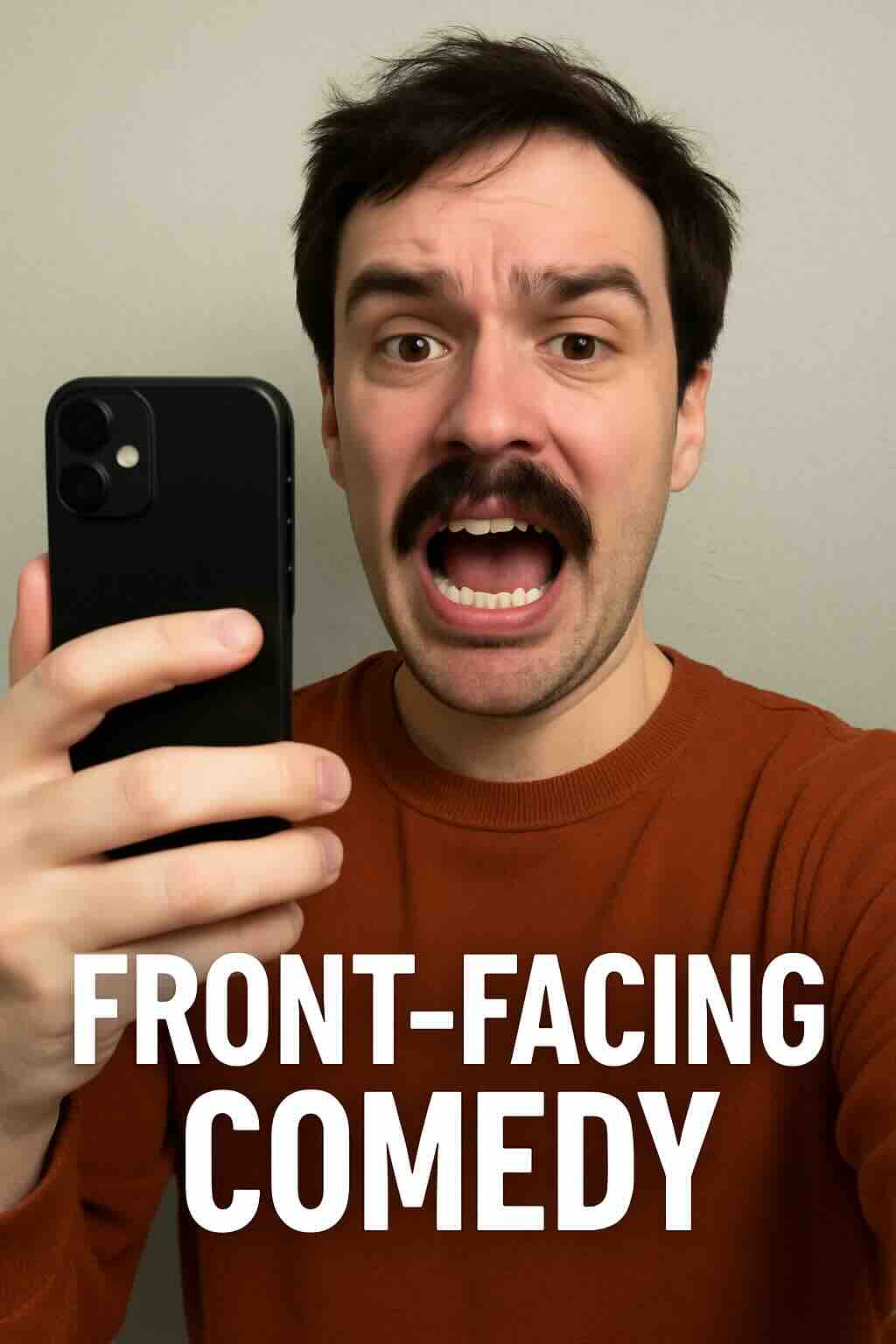7 Comedy Trends Transforming Humor in 2025
How multi-platform creators, new sincerity, and identity-focused voices are revolutionizing the world of comedy
Last updated: October 1, 2025
In 2025, alternative comedy is experiencing what experts call "its most radical transformation in decades," driven by platform diversity, authentic storytelling, and the rejection of choosing between meaningful and funny content. Comedians are now multi-format creators working simultaneously across stand-up, podcasts, social media, and scripted content while embracing vulnerability and new sincerity as their own form of boundary-pushing.
Quick Navigation
1 Multi-Platform Comedy Creators

The most significant shift in 2025's comedy scene is comedians becoming multi-format creators who work simultaneously as writers, performers, directors, and producers, moving fluidly between stand-up, podcasts, social media, and scripted content.
Transmedia Storytelling
Today's alternative comedians create transmedia experiences across multiple platforms. A joke begins on TikTok, develops into a podcast segment, becomes stand-up material, and eventually transforms into a sketch or scripted series. This cross-pollination creates richer, more layered comedy that rewards engaged audiences.
The New Comedy Career Path
78% of successful alt comedians now work across 3+ different media formats. Short-form video comedy has seen 43% growth in audience engagement since 2023. This democratization through social media means anyone with a smartphone and a good idea can potentially reach a global audience, leading to more diverse voices and perspectives.
"What's exciting about comedy in 2025 is that there's no single path anymore. You can build an audience through social algorithms, create in virtual spaces—or reject all of that and still find your people. The gatekeepers have left the building."— Patti Harrison, Alternative Comedian
2 Blending Meaningful and Funny Content

2025 has witnessed a profound shift away from the false choice between being funny or meaningful. The most exciting alt comedy work now does both simultaneously, embracing vulnerability and authentic emotion as its own form of boundary-pushing.
New Sincerity Movement
After decades of ironic detachment, comedians are now making direct ethical statements rather than maintaining ironic distance. Shows like "Hacks" and work from comedians like Hannah Gadsby blend sharp humor with genuine emotional stakes, creating comedy that doesn't hide from vulnerability.
Storytelling Integration
Comedians are increasingly weaving personal stories into their acts, creating deeper connections with audiences through narrative-driven performances. Audiences engage not just with punchlines but with the comedian's lived experiences, creating layers of meaning that reward emotional investment.
"What we're seeing in 2025 is a rejection of the idea that comedy must choose between being funny or meaningful. The most exciting work right now does both simultaneously."— Jamie Loftus, Alternative Comedian
3 Identity-Focused Comedy Revolution

The most exciting development in 2025's alternative comedy scene is the continued rise of previously marginalized voices and perspectives, with comedy podcasts focusing on specific identity experiences growing 65% in listenership. Specific lived experiences are now becoming comedic strengths.
Comedy Built from Cultural Perspectives
Comedians from different backgrounds—different ethnicities, sexualities, and life experiences—are taking to the stage, building comedy from particular cultural perspectives. This approach creates material that intentionally plays with different audience access points, transforming stereotypes into fresh comedy.
Layers of Meaning
Identity-centered comedy creates work with multiple layers—jokes that land differently depending on the viewer's own experiences and knowledge. This sophisticated approach rewards repeated viewing and creates distinct connections with different audience segments.
Authenticity as Innovation
What unites these diverse voices is their shared commitment to pushing comedy beyond simple joke delivery. Whether through structural experimentation, emotional vulnerability, or political engagement, these comedians are expanding our understanding of what comedy can do and be in 2025.
4 Experimental Format Innovation

Some venues are becoming playgrounds for comedic innovation in 2025, mixing comedy with theatre, music, or performance art, pushing boundaries and challenging what comedy can be. This experimental approach is redefining the form and function of comedy itself.
Multi-Medium Comedy Experiences
Comedy performances that integrate multiple art forms—animation, documentary elements, musical performance, dance—have become increasingly common. These hybrid approaches allow comedians to create layered experiences that transcend traditional stand-up limitations.
Regional Distinctions
The UK scene embraces hour-long thematic shows over traditional stand-up sets, often with theatrical elements and structural experimentation. Meanwhile, digital-native formats on TikTok have created entirely new quick-character study formats that often build collaboratively through community iteration.
Live Experience Revival
After the pandemic, people are really valuing those in-person experiences again. Audiences seek the communal energy of live comedy performances, creating a renaissance of experimental live venues that push beyond traditional club formats.
5 Digital-Native Comedy Formats

TikTok, Instagram, and YouTube are now the go-to places for discovering new talent, with digital platforms birthing entirely new comedy forms designed specifically for their constraints and opportunities.
Platform-Specific Innovation
Format-specific humor designed for TikTok, Twitter, and other platforms has created compressed comedy built for shorter attention spans. "Front-facing comedy" on TikTok has pioneered new quick-character study formats that often build collaboratively through community iteration and response.
Algorithmic Discovery
The algorithmic discovery mechanisms of social platforms allow highly specific comedy niches to find their perfect audience without traditional gatekeepers. This has democratized comedy creation, allowing unknown creators to rapidly gain audiences through viral content.
Community-Based Humor
Internet-native comedy often functions as collaborative creation, with jokes and characters developing through community participation, duets, and iterative responses. This represents a fundamental shift from solitary comedy writing to collective creative processes.
6 Comedians Defining 2025
These innovative performers are at the forefront of comedy's evolution, each bringing unique perspectives and approaches that are reshaping what comedy can be:
Rosebud Baker
Baker's raw explorations of trauma, recovery, and identity have redefined comedy's potential for emotional depth. Her approach blends unflinching personal revelation with unexpected structural innovations that subvert audience expectations.
Stavros Halkias
Halkias's unique blend of personal humor and high-energy delivery has established him as a distinctive voice in the alternative scene. His willingness to explore taboo subjects with both sensitivity and irreverence represents a new approach to comedy's traditional boundaries.
Melissa Villaseñor
Combining her remarkable impression skills with deeply personal material, Villaseñor creates comedy that resonates particularly with Gen Z audiences. Her work often addresses mental health, neurodiversity, and the complexities of navigating digital identity.
7 The Future: What's Next for Comedy Beyond 2025?
Looking beyond 2025, several emerging trends hint at comedy's potential evolution:
- Neuroadaptive Comedy: Early experiments with biofeedback systems that adapt comedy content based on audience physiological responses suggest a future where comedy could become increasingly personalized to individual viewers' emotional states and preferences.
- Decentralized Creation: Blockchain-backed comedy collectives that operate without traditional management structures are beginning to emerge. These decentralized autonomous organizations allow for collaborative creation and profit-sharing models.
- Global Cross-Pollination: As translation AI continues to improve, comedy is increasingly crossing linguistic borders that were previously impenetrable, facilitating unprecedented collaboration between comedy traditions from different cultures.
- Environmental Comedy: A new wave of comedy focused specifically on addressing climate anxiety through humor is gaining traction, using comedy as a coping mechanism for existential concerns while raising awareness about pressing ecological issues.
While it's impossible to predict exactly how comedy will evolve, what's clear is that the art form remains vibrant and adaptive. Far from being replaced by technology, comedy is incorporating new tools and approaches while maintaining its essential human core—the shared recognition of life's absurdities and contradictions that has defined humor throughout human history.